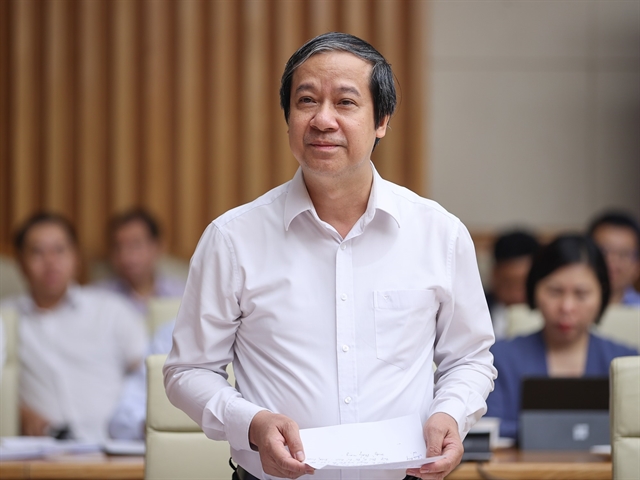 Society
Society

 |
| Minister of Education and Training Nguyễn Kim Sơn. — VNA/VNS Photo |
As Việt Nam steps into 2025, the education sector is poised to undertake significant initiatives as part of the comprehensive educational reform journey.
Minister of Education and Training Nguyễn Kim Sơn spoke with Vietnam News Agency reflecting on the past year’s achievements and sharing plans for the year ahead.
2024 was a pivotal year for Việt Nam’s education sector. Could you highlight some of the key achievements?
2024 was a year of immense efforts and high accomplishments for the education sector. We completed numerous goals that lay the groundwork for the next phase of national development.
Marking ten years since the adoption of Resolution No.29-NQ/TW on comprehensive education reform, 2024 became a milestone year with the issuance of Politburo's Conclusion No.91-KL/TW to continue implementing this resolution.
One of the most notable accomplishments was the presentation of the draft Teacher Law during the National Assembly’s 8th session.
After nearly 20 years of preparation, the draft law received broad support from lawmakers.
We are now working to incorporate their feedback aiming to submit it for a second review at the 9th session in 2025. We aim to have this law passed, which would be a transformative step for the teaching profession.
Additionally, 2024 saw the near completion of the first cycle of the 2018 General Education Programme across all three levels nationwide. Textbooks for grades one to 12 have been reviewed and approved, ensuring a smooth transition to the new curriculum.
The final national high school graduation exam under the old 2006 programme was successfully conducted, paving the way for a reformed exam system, starting in 2025.
Further highlights included exceptional performances by Vietnamese students in regional and international Olympiads, increased university enrollment numbers and strong interest in artificial intelligence and semiconductor training, a promising sign aligned with the Government’s vision for high-tech workforce.
On the infrastructure and workforce front, we held a national conference on school construction and teacher accommodations, reaffirming our commitment to achieving 100 per cent standardised school facilities by 2030. While teacher shortages remain challenging, flexible and decisive solutions have been implemented in many localities.
Looking ahead to 2025, what will be the education sector’s priorities?
In 2025, our mission is to build on the achievements of 2024 and continue advancing comprehensive educational reform. A key focus for that will be finalising and implementing the Government’s Action Plan based on Conclusion No. 91-KL/TW. This plan will outline actionable steps for educational development.
We will also conclude the first cycle of the 2018 General Education Programme by mid-2025, which involves conducting the new university entrance exam and summarising lessons from the programme’s implementation. This evaluation will guide deeper reforms going forward.
Another major task for 2025 is to finalise and present the Teacher Law to the National Assembly for the second review. We hope this law will address long-standing challenges in educational management while also reflecting our aspirations for a robust and modern teaching workforce.
Furthermore, 2025 will mark the launch of the new Early Childhood Education Programme on a pilot basis in 20 provinces and cities. This is a crucial step toward addressing challenges at this foundational, yet under-resourced, education level.
2025 will also be a year for the Ministry of Education and Training to carry out restructuring to enhance efficiency, as directed by the central Government. This will involve extensive work throughout the year, reflecting our commitment to administrative reform and better governance.
Việt Nam is entering a new era characterised by rapid advancements in science, technology, and digital transformation. Recent resolutions by the Politburo and directives from the Prime Minister emphasise developing human resources for key industries such as semiconductors and other digital technologies. As education is the cornerstone of these efforts, our sector will play a pivotal role in this transformative period.
The Prime Minister recently approved the Education Development Strategy to 2030, with a vision toward 2045. What does this strategy mean for the sector?
The strategy is a significant step in institutionalising the Party and State’s views on education as a top national policy and a critical driver of socio-economic development. It envisions a modern education system that builds on Việt Nam’s cultural traditions, while embracing global advancements in science and technology.
By 2030, we aim to achieve an advanced education level within Asia, progressing to world-class standards by 2045. This involves fostering lifelong learning while ensuring equitable access to education. Our approaches emphasise standardisation, modernisation, socialisation and global integration.
In 2025, we will start implementing this strategy, focusing on establishing a strong foundation for the ambitious goals it sets out.
As we begin the New Year, do you have a message for educators and students?
The work we complete this year will set the stage for progress over the next five years. I urge everyone in the education sector to continue their efforts with unwavering dedication and resilience.
In 2024, we witnessed remarkable policies and investments in education from central and local governments. I hope this momentum will continue in 2025, accompanied by greater societal support and understanding.
To all educators, I extend my best wishes for health, happiness and success. To students, I wish you a year filled with joy, learning and achievement. — VNS




